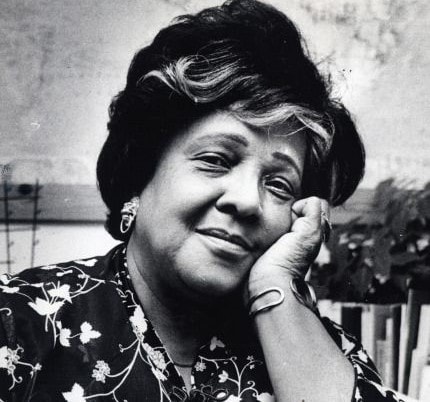“She brought only one weapon with her when she gained access to the halls of power on behalf of her readers; it was to ask questions that others were not asking … and she got answers. ~ James McGrath Morris, Author
On August 14, 1911, Ethel Lois Payne was born to William A. Payne and Bessie Payne (née Austin) in Chicago, Illinois; she was the fifth of their six children. Her father, who worked as a Pullman porter, and her mother, a teacher of Latin, were professionals. Her paternal grandparents and maternal grandparents were enslaved, respectively, in Tennessee and Kentucky. Her father moved to the North during The Great Migration.
The Payne family lived on the South Side of Chicago, their Englewood home located across the street from Greater Saint John AME Church of Chicago, where they were active. Tragically, William contracted a deadly virus from handling soiled linens and clothing while working as a porter and passed away when he was only forty-six years old; Ethel was twelve years old. In order to support their family, Bessie opened their home to house boarders, performed domestic work and taught.
An insatiable reader, especially of the works by Paul Laurence Dunbar, Ethel attended Copernicus Elementary School and Lindblom Technical High School, which were located in a White community of Chicago. She and her siblings experienced racial discrimination and assault in this community, even having rocks hurled at them. This influenced her to want to pursue a career in law, protecting those, such as her frail brother, who were less able. Despite those heinous encounters, Payne performed well academically, especially in history and English. One of her English teachers was very supportive of her, encouraging and assisting her in getting her first article published in Abbott’s Monthly, a literary magazine.
Upon her graduation from Lindblom, Payne begin pursuing higher education at Crane Junior College, followed by Garret Biblical Institute, from where she graduated in 1934. Having earned her certificate, she intended to become an attorney; however, the University of Chicago Law School denied her admittance, one of the reasons being her race. Instead, she worked in various capacities, including as a matron at the State Training School for Girls in Geneva, Illinois and as a nursery teacher in settlement houses and elementary schools in Chicago.
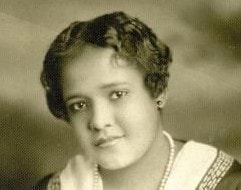
In 1937, she accepted a position working at the Chicago Public Library, where rose to the rank of senior library assistant. While working at the library, from 1940-42, she took courses at Medill School of Journalism at Northwestern University. Active in community civil rights affairs, Payne was appointed to serve on the Illinois Interracial Commission by Governor Dwight H. Green.
In 1948, Ethel Payne, responding to a domestic initiative to serve American forces overseas, moved to Japan to work for the U.S. Army Special Services Club. Starting as a hostess, Payne ultimately became the director of the military social services club, quartermaster depot in Tokyo.
At this time, the military was to be racially integrated, as commanded by President Harry S. Truman; however, General Douglas MacArthur refused desegregation. She was present to view how terribly the U.S. military was treating African-American troops, Payne began recording in her journal, as Ashlee Anderson wrote in the “Ethel L. Payne” biography for the National Women’s History Museum, “about the segregation of the soldiers, the racial slurs that were used against them, and about the babies that were abandoned as orphans because they were born to Japanese mothers and Black fathers.”
Payne shared excerpts of her journal reflections on race relations with L. Alex Wilson, an African-American reporter for the Chicago Defender, who was on assignment to cover the Korean War. The Chicago Defender, a Black-owned, weekly newspaper created to serve the interests of the Black community, was the premier Black news publication of the United States.
Wilson, with Payne’s permission, sent her writings to the newspaper’s editors. From her detailed, primary accounts, the editors composed an article, the first of a series, on the U.S. military’s racially discriminate practices in Japan. It was published on the front page. While these articles were criticized by some because it brought negative attention to this country’s military, they led to increased circulation for the Chicago Defender.
Although Black America’s favorite newspaper had approximately one hundred and thirty thousand subscribers, it reached far more readers. Because it promoted Black advancement, including moving for better opportunities, à la The Great Migration, the publication was banned in many states in the South. In fear of violent reprisals, many Blacks refrained from having the newspaper sent to their homes.
In order to counter this, editors of the Chicago Defender would deliver copies to Pullman porters who would surreptitiously deliver them to Black community institutions, including churches, barbershops and beauty salons, that were on their routes. In Eye on the Struggle: Ethel Payne, the First Lady of the Black Press, author James McGrath Morris wrote, “The Defender’s national readership was considered so threatening to racial order that the U.S. government military intelligence created a 64-page report on its circulation growth, complete with maps, as if charting the progress of an invading force.”
Highly pleased with the quality of Ethel Payne’s work, the editor-in-chief of the Chicago Defender offered her a full-time position as a reporter. She accepted, having returned to the States in 1951 and immediately began working for Sengstacke Newspapers, which published the Chicago Defender. For the next two years, Ethel Payne worked as a reporter and associate editor. She covered topics, such as the adoption crisis for Black children and the struggles that single mothers suffered, that were often considered taboo. In 1952, Payne moved to Washington, D.C. in order to better cover the news and historical events.
In 1953, she assumed control of the one-person bureau of the Chicago Defender. As the District’s correspondent for Sengstacke Newspapers, her coverage of national news was expanded to allow her to focus on world affairs. Accordingly, Ethel Payne became the first African-American woman correspondent to report on international news coverage. Acting in this position at Sengstacke Newspapers until 1973, Ethel Payne was one of only three accredited African-American members of the White House Press Corps.
From 1951 to 1978, Payne worked at the Chicago Defender and was actively involved in many pivotal events, significantly during the Civil Rights Movement, affecting Black America. She was present at groundbreaking moments of the Movement, including the Montgomery Bus Boycott in Alabama (1955-56); the desegregation of the University of Alabama in Tuscaloosa (1956); the desegregation of Central High School in Little Rock, Arkansas (1957) and the March for Jobs and Freedom in Washington, D.C. (1963).
As a journalist, Ethel Payne was highly committed to advancing the cause of Black people and this commitment meant risking her freedom, even her life, at points. Traveling in the South was dangerous for Blacks, especially outspoken ones who were reporters. In her travels down there, she authored a series, “The South at the Crossroads”, which was an analysis of the lower American region during the Civil Rights Movement.
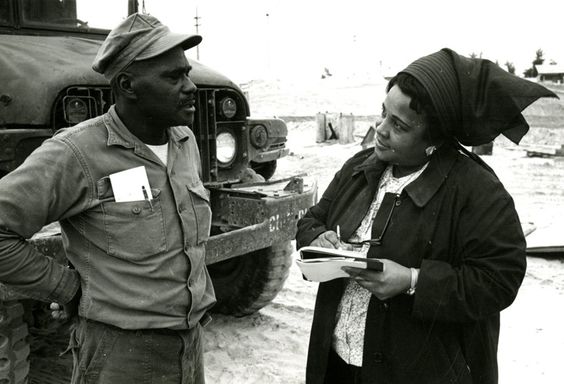
It was during her time in the South, covering the battle for civil rights that she first became acquainted with Rev. Dr. Martin Luther King, Jr. In his biography on Payne, Morris relayed her acquaintance with King was years prior to her White colleagues’ knowledge of him and this was primarily due to Whites’ dismissal of Black life. Morris reported that Payne wrote of King, “This gladiator going into battle wears a reverse collar, a flowing robe and carries a Bible in his hand.”
Concerned with human rights, the foundation of her journalism rested on her belief that civil rights in the United States and human rights throughout the world were intertwined. As such, Payne, on her ten-nation reporting tour, attended the 1955 Bandung Conference; she was accompanied by Congressman Rev. Dr. Adam Clayton Powell, Jr. and renowned author Richard Wright. This conference was an international meeting of twenty-nine Asian and African countries, many of which had recently gained their independence. Its purpose was to promote cultural and economic cooperation among the Afro-Asian collective and oppose colonialism. In The Color Curtain: A Report on the Bandung Conference (1956) authored by Wright, he highlighted several of his exchanges with Payne.
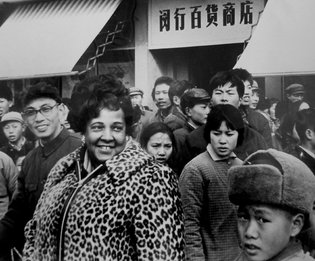
(No copyright infringement intended).
Serving as a correspondent, Ethel Payne, in 1966, became the first Black reporter to cover the Vietnam War. The Chicago Defender had sent her to cover the Black troops who were serving. The next year, she covered the Biafran War. Additionally, she reported on the civil war in Nigeria and was one of the first journalists to visit China after the 1972 visit of President Richard Nixon. She also attended the International Women’s Year Conference in Mexico City and covered a six-nation tour with Secretary of State Henry Kissinger.
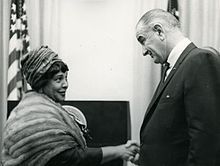
Ethel Payne covered every president from Dwight D. Eisenhower to Ronald Reagan, challenging each on civil rights issues, topics that were critical to Payne and her readers. Payne was trained by Clarence M. Mitchell, Jr., the chief lobbyist for the National Association for the Advancement for Colored People (NAACP), in asserting her position. It would be with Eisenhower where Payne truly earned her reputation for asking questions that others were too timid to ask.
During a July 7, 1954 press conference, Payne peppered the president with queries. She initially asked him why the choir of Howard University, a historically Black university in Washington, D.C., was barred from performing at a Republican event attended by Eisenhower. He feigned ignorance of the last-minute change.
After being barraged with questions regarding racial disparities, discrimination and segregation and noting the recent passage of Brown vs. Board of Education, she stated, “Mr. President, we were very happy last week when the deputy attorney general sent a communication to the House Interstate and Foreign Commerce Committee saying that there was legal basis for passing a law to ban segregation in interstate travel … I would like to know if we could assume that we have administration support in getting action on this?” Angrily, he snapped, “You say that you have to have administrative support. The administration is trying to do what it thinks and believes to be decent and just in this country and is not in the effort to support any particular or special group of any kind.”
His hostile response in refusing to support “special interests” propelled the civil rights issues to the forefront of trials facing the United States. This was especially concerning, considering that the nation’s president dismissed African-Americans’ fight for equal rights was merely a “special interest”. From an international vantage, her critiques alerted other nations that race relations in America were far from equitable or amicable. While Eisenhower experienced serious backlash for his stance, Payne was “blackballed”, with him refusing to call on her during the remainder of his executive term. Additionally, Press Secretary James Hagerty attempted to remove her credentials as a journalist; he even led an investigation, which involved examining her income tax returns, on her.
Payne remained true to her mission, representing the Black community, especially those readers of the Chicago Defender. Her personal and professional interests were so important that even in lean economic times, she continued running the D.C. office of the Black newspaper while working a second position in order to make ends meet. Additionally, Payne was an advocate, lobbying for labor unions and, on behalf of the Democratic Party, voter registration. In his Eye on the Struggle: Ethel Payne, the First Lady of the Black Press, Morris reflected on how journalists in contemporary times often do not advocate for issues due to conflict of interests. However, Ethel Payne was different because of her mission and audience. He remarked, “Newsmakers never ceased to complain about her aggressiveness … Payne saw herself both as an emissary from and as a representative of a large group of Americans long neglected by a mainstream medium.”
Ethel Payne continued making history when, in 1972, she became the first African-American woman hired by a national network to act as a radio and television commentator. She would work on CBS’ Spectrum and Matters of Opinion until 1982. Continuing to grow in her passion and inspire others, Payne also accepted in 1972 to serve as the Ida B. Wells Distinguished Journalism Chair at Fisk University, a historically Black university in Nashville, Tennessee.
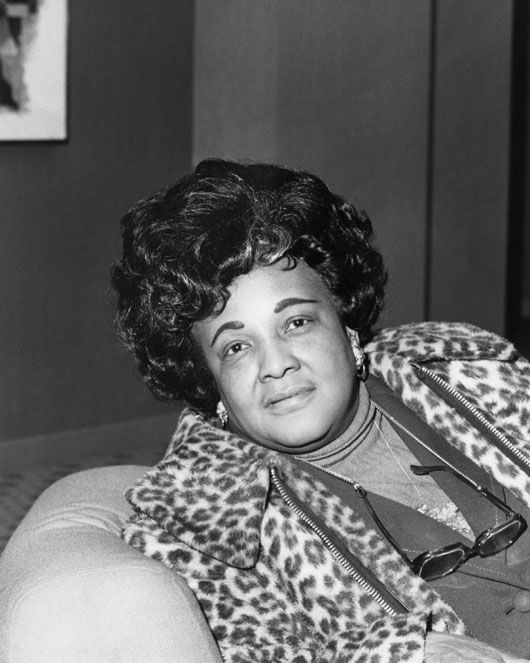
She remained diligent as an advocate for civil rights, domestically and internationally, including demanding the release of anti-apartheid activist Nelson Mandela from a prison cell in South Africa. During her time at the network, she left the Chicago Defender in 1978; that same year, she became an associate of the Women’s Institute for Freedom of the Press. The purpose of this nonprofit publishing organization is, as per its website, to heighten effective “communication between women and connect the public with forms of women-based media.”
On May 28, 1991, Ethel Payne passed away, having suffered a heart attack; she was seventy-nine years old.
The National Association of Black Journalists established the Ethel Payne Fellowship to honor her trailblazing work, which included working as a foreign journalist in Africa, covering the terms of seven U.S. presidents and serving as a war correspondent. It is awarded to journalists who seek to gain professional experience in covering assignments in Africa. She is also one of only four women journalists who, in 2002, were honored with a commemorative stamp by the U.S. Postal Service.
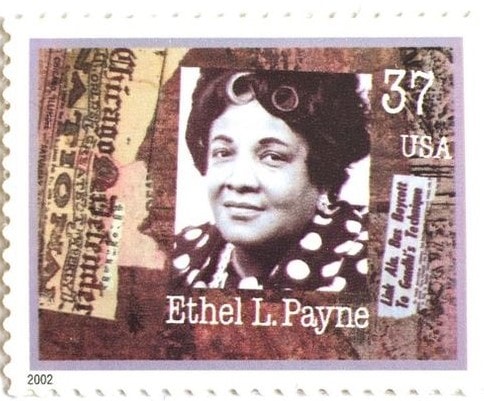
Her many accolades and honors include the Newsman’s Newsman Award (1954); the Gertrude Johnson-Williams Award by Johnson Publishing Company (1982); the Lifetime Achievement Award by the National Association of Black Journalists (1982); the African Freedom Award by TransAfrica (1987); and the Candace Award by the National Coalition of 100 Black Women (1988). Her papers are archived at the Library of Congress, Howard University and Smithsonian Anacostia Community Museum.
Ethel Payne truly earned her title, “The First Lady of the Black Press”. Although she was a pioneering journalist, her legacy is still relatively unknown. In his book, Morris spoke on this travesty, lamenting, “Sadly, only twenty-four years after her death, she is little remembered, a victim of the very racism she fought as a journalist. ‘Had Ethel Payne not been Black’, The Washington Post noted in an editorial on her passing in 1991, ‘she certainly would have been one of the most recognized journalists in American society.’ Ethel Lois Payne’s story offers a gentle reminder that the great power of a free press rests on the simple notion of rendering those in power accountable.”
“I stick to my firm, unshakeable belief that the Black press is an advocacy press, and that I, as a part of that press, can’t afford the luxury of being unbiased … when it comes to issues that really affect my people, and I plead guilty, because I think that I am an instrument of change.”
~ Ethel Payne
